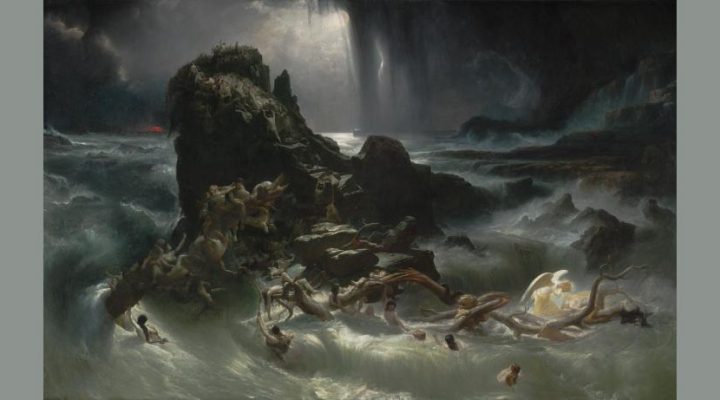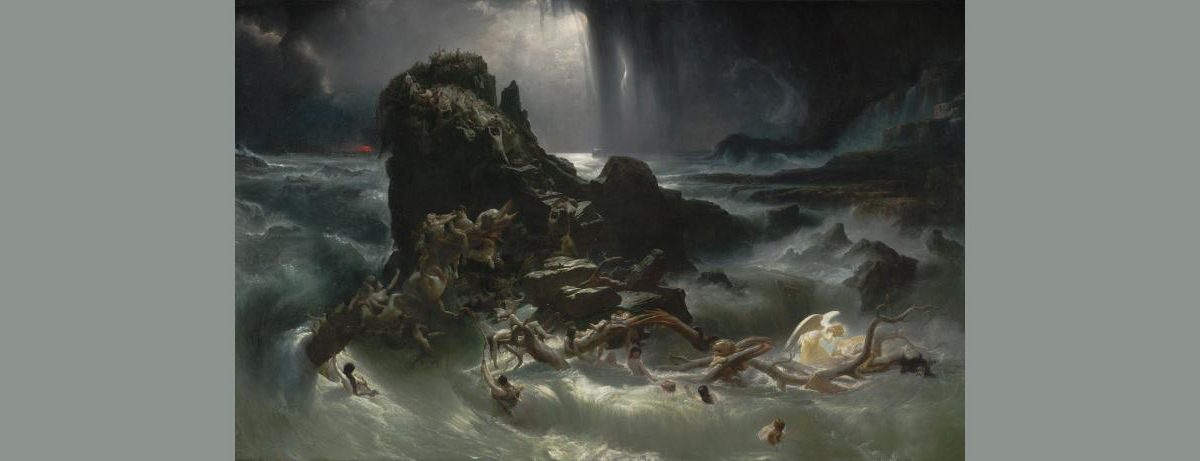“As it was in the days of Noah,” Jesus said, “so will be the coming of the Son of Man. For as in those days before the flood they were eating and drinking, marrying and giving in marriage, until the day Noah entered the ark, and they knew nothing until the flood came and swept them all away, so too will be the coming of the Son of Man.”
In this first century biblical passage, Jesus speaks of God’s pending apocalyptic intervention in human affairs. In our 21st century reading, the pending apocalypse is of our own creation.
“And they knew nothing!” Noah’s neighbors didn’t get it, did they? It rained and rained, the waters rose, and the floods came. The way Jesus tells it, they went about life as they always had, eating, drinking, marrying, until, as Genesis 7:19 says, “The waters swelled so mightily on the earth that all the high mountains under the whole heaven were covered.” Three verses later, Genesis 7:22 describes their fate: “Everything on dry land in whose nostrils was the breath of life died.”
“Only Noah, his family and the animals they collected survived onboard the ark; the rest were apparently climate deniers to the bitter end.”
Reading those words in 2022, I keep wondering, when did the people of Noah’s day realize there was no escape? In Genesis, only Noah, his family and the animals they collected survived onboard the ark; the rest were apparently climate deniers to the bitter end. In our case, the only ark we’ve got is the earth itself, and it is leaking like a sieve.
That Genesis passage seems particularly poignant in the aftermath of Hurricane Ian, the storm that swept across Florida with wind and rain climate experts believe was exacerbated by global warming. An Oct. 23 New York Times story on loss of life called it “the deadliest storm in a generation” and quoted the niece of a Naples, Fla., victim who observed that her aunt “thought it wouldn’t hit here, and when it did take a turn, I think she knew it was going to be bad.”

Bill Leonard
Global forest fires, rising ocean levels, melting glaciers and mega-storms provide convincing evidence that things are “bad” environmentally. Yet climate denial continues, documented in a study by the Center for American Progress showing “there are 139 elected officials in the 117th Congress who still deny the scientific consensus of human-caused climate change.” How many more are on the ballot in this November’s election?
After decades of warning, time is running out. This year, the United Nations Intergovernmental Panel on Climate Change released a report cautioning that our global village has no more than three years of environmental course correction available before even more devastating weather-related environmental catastrophes become the order of the day. Will we act accordingly?
When it comes to information and analysis of issues related to our “environmental crisis” I continue to benefit from the work of my longtime friend Roger Gottlieb, William B. Smith Professor of Philosophy at Worcester Polytechnic Institute. A highly regarded authority on environmental realities and possibilities, Gottlieb also offers insights into the role of religion in it all. In Morality and the Environmental Crisis he writes:
By “environmental crisis” I mean two things. First, the sheer scope of what we have done. Second, how the leading cultural and political institutions either directly contributed to this damage; failed to foresee it; or refused to recognize it even after it was well under way. The environmental crisis is thus not just a complex and daunting collection of problems with our bodies and the earth, it is a fundamental problem with our — in the broadest sense of the term — civilization.
To illustrate, Gottlieb offers a representative list of dire environmental realities, including:
- The World Health Organization estimates three to six million deaths annually are attributable to air pollution.
- A precipitous drop in insect populations, up to 75%, is potentially catastrophic to human agriculture in particular and plant species life in general.
- In the United States 40% to 50% of rivers and lakes cannot support life.
- Human activity impacts the fastest and largest disappearance of species in 70 million years — one species every eleven minutes.
- Rainforests, overburdened by what we have done to the atmosphere, now produce rather than absorb CO2.
Gottlieb says that with certain exceptions, world religions have perceived the “nonhuman” world “in terms of human interests, beliefs and social structures — to frame nature’s significance in human terms.” He notes: “The Judeo‑Christian tradition, closely associated with a European industrial civilization that brought the environmental crisis into the modern world, was typically concerned (at best) with the ‘wise use’ of the earth and its creatures, and not with any notion of their inherent value. … While nature might be a sign of God, the sign itself had little or no moral standing.”
“Only a few saints and reformers have taught that people have direct moral responsibilities to nonhuman creatures.”
Gottlieb cites environmentalist Steven Rockefeller: “The social and moral traditions that have been dominant in the West … have not involved the idea that animals, trees or the land in their own right, as distinct from their owners or their Creator, have moral standing. Only a few saints and reformers have taught that people have direct moral responsibilities to nonhuman creatures.”
In 2022, those “few saints and reformers” remain a minority amid environmental crises that grow more intense with each new day. Worse yet, global societies, especially in the United States, seem so irreconcilably divided over “normal” living — “eating and drinking, marrying and giving in marriage” — than confronting the “abnormal” realities of climate collapse seems unlikely if not impossible.
The Genesis text’s description of the world on the eve of the flood sounds all too 21st century: “Now the earth was corrupt in God’s sight, and the earth was filled with violence.”
I write this essay the day after yet another teen shot yet another teacher and student in yet another school; when early voters report polling place surveillance by armed “militia” members for purposes of intimidation; and where election deniers threaten poll workers and office seekers daily; and climate deniers assert that “climate change is natural and normal; it’s happened at other points in history.” Is this our future until “the flood comes” and sweeps us all away?
In his 2015 book, Political and Spiritual, Gottlieb links these varied social upheavals as forces separating us from the sense of community necessary to confront the environmental crisis, undermining the role of religion in fostering such community. He writes:
There is no part of the earthly web of life that is not affected by human beings; no social relation of oppression that does not have some role in ecological degradation; and no form of ecological degradation the effects of which are not made worse by social inequality. To honor nature we need not only new prayers and rituals, but a radical alteration in our basic social structures. And we cannot heal social injustice without transforming our relations to nature. Therefore a concern for social order is now essential to religious ethics, and false dichotomies between nature and humanity, and between religion and politics, have been swept away.
World without end? One can only hope. Amen.
Bill Leonard is founding dean and the James and Marilyn Dunn professor of Baptist studies and church history emeritus at Wake Forest University School of Divinity in Winston-Salem, N.C. He is the author or editor of 25 books. A native Texan, he lives in Winston-Salem with his wife, Candyce, and their daughter, Stephanie.
Related articles:
The fantastical world of climate change denial: Slouching toward annihilation | Opinion by Rodney Kennedy
Christians and climate change: A chance to take the Bible seriously | Analysis by Chris Conley
Oregon is burning while most white Christians deny climate science | Opinion by Susan Shaw


